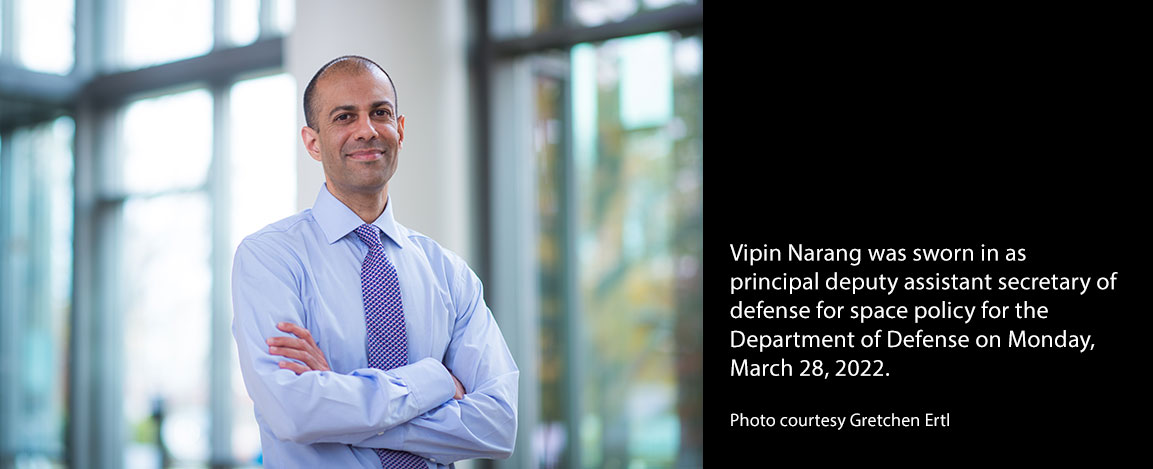Narang will take a public service leave of absence from his position as the Frank Stanton Professor of Nuclear Security and Political Science at MIT while working at the Department of Defense.
The Center for International Studies is pleased to announce that Vipin Narang, professor in the Department of Political Science and member of the Security Studies Program, was sworn in as principal deputy assistant secretary of defense for space policy on Monday, March 28, 2022.
Narang will work as deputy to the assistant secretary of defense for space policy, John Plumb.
The Office of the Assistant Secretary of Defense for Space Policy is responsible for interagency coordination and international engagement on space policy and strategy, which includes nuclear, cyber, and missile defense policy.
“Through his extensive research, Vipin is the country’s leading scholar of nuclear strategy and proliferation,” said M Taylor Fravel, Arthur and Ruth Sloan Professor of Political Science and director of the Security Studies Program.
David A Singer, the Raphael Dorman-Helen Starbuck professor and head of the Department of Political Science, applauded the Department of Defense’s (DoD) choice.
“Vipin is level-headed, collaborative, and whip-smart. I can think of no better person to help guide DoD policy in this crucial domain,” he said.
Narang will take a public service leave of absence from his position as the Frank Stanton Professor of Nuclear Security and Political Science at MIT while working at the DoD.
Biography
Vipin Narang is the Frank Stanton Professor of Nuclear Security and Political Science at MIT and member of the Security Studies Program at the Center for International Studies.
His first book Nuclear Strategy in the Modern Era (Princeton University Press, 2014) on the deterrence strategies of regional nuclear powers won the 2015 ISA International Security Studies Section Best Book Award. His second book Seeking the Bomb: Strategies of Nuclear Proliferation (Princeton University Press) was published in early 2022. His work has appeared in a variety of outlets including International Security, Journal of Conflict Resolution, The Washington Quarterly, International Organization, Foreign Affairs, The Washington Post, and The New York Times. He was the recipient of the 2020 ISSS Emerging Scholar Award from the International Studies Association awarded to the scholar who “had made the most significant contribution to the field of security studies.”
He received his PhD from the Department of Government, Harvard University in 2010. He holds a BS and MS in chemical engineering with distinction from Stanford University and an M Phil with Distinction in international relations from Balliol College, Oxford University, where he studied on a Marshall Scholarship. He has been a fellow at Harvard University’s Olin Institute for Strategic Studies, a predoctoral fellow at Harvard University’s Belfer Center for Science and International Affairs, and a Stanton junior faculty fellow at Stanford University’s Center for International Security and Cooperation. His research interests include nuclear proliferation and strategy, North Korea's nuclear weapons, South Asian security, and general security studies.
Recent publications
"Sole purpose is not no first use: nuclear weapons and declaratory policy," War on the Rocks, February 22, 2021. With Ankit Panda.
"India's Pangong Pickle: New Delhi's Options After its Clash with China," War on the Rocks, July 2, 2020. With Christopher Clary.
"Is A New Nuclear Age Upon Us?" Foreign Affairs, December 30, 2019. With Nicholas L. Miller.
"Why North Korea Is Testing Missiles Again," Foreign Affairs, May 16, 2019. With Ankit Panda.
Recent videos
A Nuclear Threat from the Taliban? - Vipin Narang at City University of New York
How Do States Seek the Bomb? - Vipin Narang at the Carnegie Endowment for International Peace
Hedges, Technology, & the Future of Proliferation - Vipin Narang at the Institute for Security and Technology



